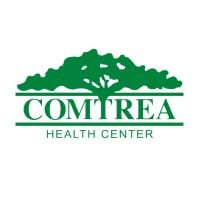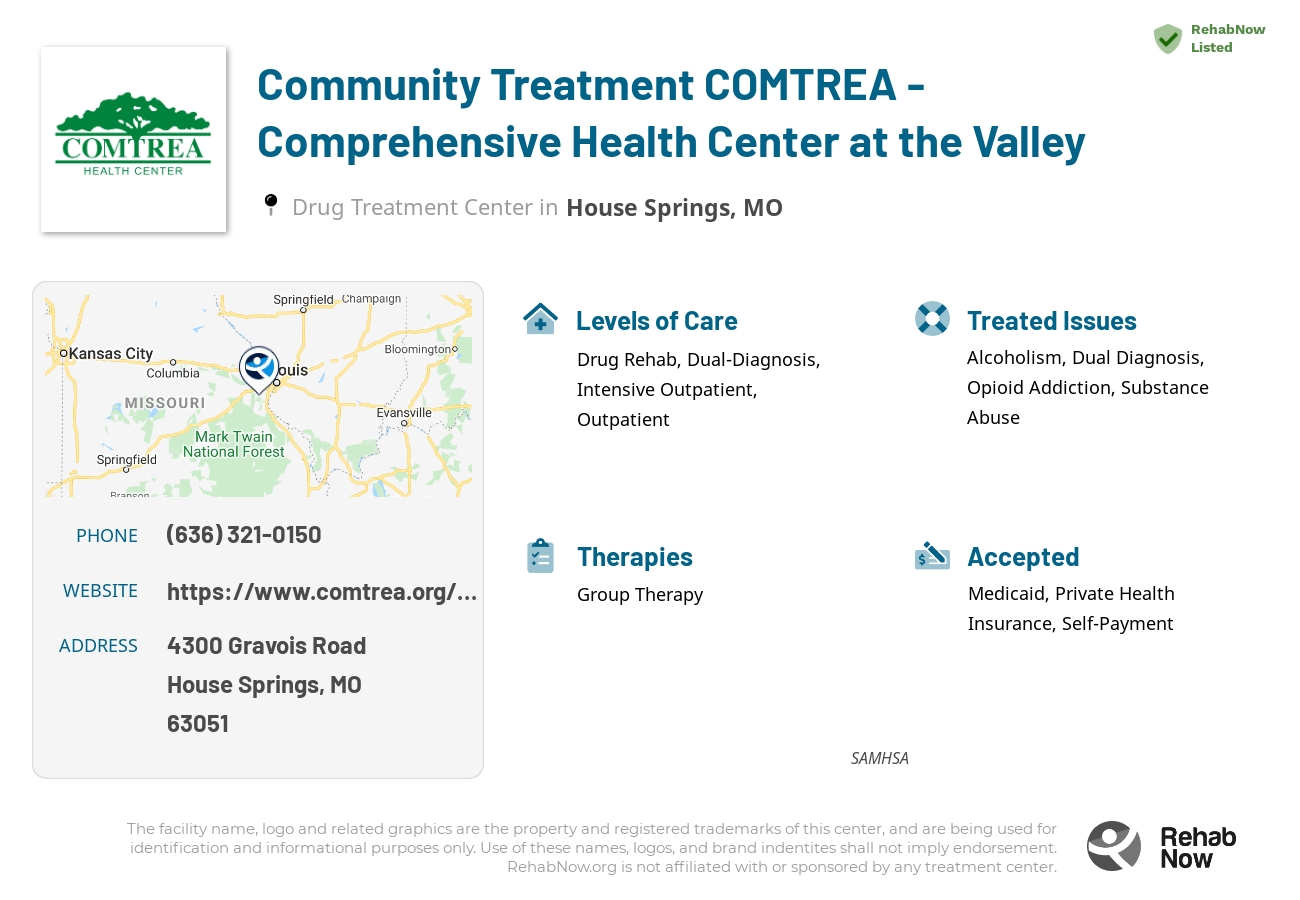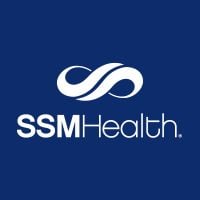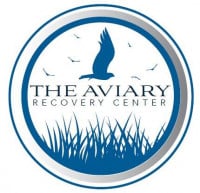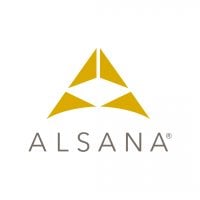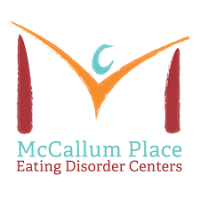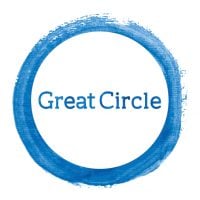Community Treatment COMTREA - Comprehensive Health Center at the Valley
Drug Rehab Center in House Springs, Missouri
The Comprehensive Health Center at the Valley offers an accredited Drug Rehab program that provides personalized treatment plans and a variety of therapeutic approaches, including Cognitive-Behavioral Therapy, Dialectical Behavior Therapy, Yoga, Mindfulness Meditation, Relaxation Techniques, Art Therapy, Music Therapy and Nutrition Counseling to help individuals struggling with substance abuse achieve sobriety.
About Community Treatment COMTREA - Comprehensive Health Center at the Valley in Missouri
Community Treatment COMTREA - Comprehensive Health Center at the Valley, located in House Springs, Missouri, focuses on the treatment of alcoholism, drug addiction, dual diagnosis, opioid addiction, and substance abuse. It stands out for its comprehensive care approach, including individualized treatment plans and medication-assisted treatment for opioid addiction.
Accredited by the Missouri Department of Mental Health, licensed by the Joint Commission, and a member of NAATP, this private rehab offers a range of inpatient and outpatient programs. These programs encompass tailored counseling services, crisis intervention, psychiatric and medical evaluations, among other supportive services.
- Tailored counseling and evidence-based therapies cater to individual needs, highlighting the center's commitment to personalized care.
- Medication-assisted treatment for opioid addiction showcases their modern and compassionate approach to overcoming substance dependence.
- Recognition by the National Institute of Drug Abuse (Circle of Excellence Award, five times) underlines their leadership in addiction treatment and recovery.
They specifically address issues like alcoholism, drug addiction, dual diagnosis, and opioid addiction, utilizing treatments that include cognitive behavioral therapy (CBT), dialectical behavior therapy (DBT), and motivational interviewing. Various levels of care, including both inpatient and outpatient services, are available to meet the needs of individuals at different stages of recovery.
Genders
Ages
Modality
Additional
Accreditations
SAMHSA

CARF
The Commission on Accreditation of Rehabilitation Facilities (CARF) is a non-profit organization that specifically accredits rehab organizations. Founded in 1966, CARF's, mission is to help service providers like rehab facilities maintain high standards of care.
Conditions and Issues Treated
Substance abuse is the excessive use of any drug. This includes alcohol, medications, and illegal drugs. Substance abuse is treated with a combination of physical and mental treatments. Patients detox and follow up with therapies that target the underlying cause of the addiction. Substance abuse is a severe problem that can be successfully treated with a variety of therapies. Community Treatment COMTREA - Comprehensive Health Center at the Valley treatment uses a combination of therapies along with other resources to overcome substance abuse.
Opioid addiction treatment should be done in a medically supervised drug rehab. While taking opioids, users will typically use other substances to enhance the effects of opioids or to reduce the adverse effects of opioid use. Opioid addiction treatment will include detoxification and drug rehab counseling to help both the user and their loved ones learn how to live a successful sober lifestyle.
Treatments such as methadone, buprenorphine, and naltrexone are three medications that can help treat opioid addiction. These drugs work on the brain’s pleasure center and reduce cravings and the effects of illicit opioids such as heroin. These drugs can be either given orally or by injection. Individual drug rehab counseling sessions can be helpful to discuss any questions or concerns with the drug treatment program. This counseling will also help the user set goals for when they finish drug rehab.
Opioid addiction recovery is a long process. Many of the changes to the brain caused by opioid use cannot be undone, but with time and the proper treatment, a person can return to normal function. After detox, treatment will include drug rehab counseling and entering a halfway house or sober living community. Aftercare is critical to long-term recovery, as it helps the user avoid relapsing and entering back into drug rehab.
Levels of Care Offered
This center offers a variety of custom treatment tailored to individual recovery. Currently available are Drug Rehab, Dual-Diagnosis, Intensive Outpatient, Outpatient, with additional therapies available as listed below.
Intensive outpatient treatment is a type of comprehensive addiction care. Unlike conventional residential treatment programs, the patients live at home during the recovery process. This means that one can continue working and caring for their families. These also allow people to keep pursuing their studies while also working on their sobriety.
Outpatient treatment can help one transition to normal life from the round-the-clock supervision and treatment available during inpatient treatment. It is an excellent tool to ensure long-term recovery. However, it is essential to note that intensive outpatient treatment in itself does not remove patients from the real-world setting. This means there’s always a higher risk of coming across environmental triggers. To further prevent relapse, an outpatient treatment center should be able to provide ongoing support services.
Once the patient is enrolled in an intensive outpatient treatment program, they will be expected to attend therapy and group meetings daily for a stipulated period. The frequency and duration of each session will depend on the patient’s needs and level of addiction. This can help curb the habit and deal with underlying issues that led to it. Most of these professional treatments are designed to allow patients to structure their daily schedules in a way that is conducive to recovery.
“Outpatient treatment is ideal for those who have a lower intensity addiction. It’s also suitable for those with a supportive environment and those on a tight budget.
Outpatient treatment can be considered the lowest intensity level of addiction treatment. It is ideal for early phase addiction or lower intensity addictions. It may involve weekly sessions instead of daily. Peer group support, 12-step programs, and individual counseling may still be used and anti-addiction medication.
Therapies & Programs
Group therapy is held in a safe, controlled setting where patients can feel comfortable sharing their struggles and gaining perspective through shared conversations. It takes place in a group rather than one on one to prevent feelings of isolation or being unique in their situation while creating an environment for addicts at Community Treatment COMTREA - Comprehensive Health Center at the Valley to develop fellowship, accountability, and support. Group therapy is an important tool in recovery that prevents cravings that prompt a return to active addiction.
Dialectical Behavior Therapy is a form of Cognitive Behavioral Therapy that helps patients understand the relationship between their thoughts, feelings, and behaviors. It is beneficial for those whose addictions and behaviors stem from severe mental health issues. It aims to help the patient achieve their goals and identify how they can enhance their lives.
Cognitive-behavioral therapy is a talking-based method that helps people struggling with addiction replace destructive behaviors with healthier ones. CBT also helps them identify the underlying thoughts and beliefs that cause these behaviors in the first place and ways to control those thoughts and feelings. It can be administered as a holistic therapy or as part of combination therapy and—as opposed to turning to drugs and alcohol—helps addicts learn how to respond to negative thoughts instead.
Eye Movement Desensitization and Reprocessing (EMDR) is a fairly new treatment modality used with patients diagnosed as suffering from post-traumatic stress disorder (PTSD) or drug and alcohol cravings.
EMDR is considered to be a form of cognitive-behavioral therapy (CBT) and exposure therapy. CBT is a technique used to help individuals replace maladaptive, symptomatic behaviors with more appropriate ones utilizing cognitive, emotional, or behavioral interventions. Exposure therapy is a type of CBT used to treat anxiety disorder individuals by gradually introducing the patient to the feared object, activity, or situation in a safe and controlled environment.
EMDR therapy is a form of exposure therapy that combines CBT with other approaches such as psychodynamic and interpersonal. It is believed to help patients reprocess their memories, thoughts, and emotions to heal from the trauma of their experience. The goal is to help patients lead more normal lives by reducing the distress that has been associated with the memories of an event through the use of CBT techniques.
Life skills training is beneficial for addicts in recovery because it helps them learn how to take care of themselves and improve their quality of life, which can promote feelings of purpose and motivation.
This type of treatment works by teaching individuals life-enhancing skills that support positive living, including:
- Healthy lifestyle habits
- Skills to effectively manage stress
- Effective communication skills to help them get their needs met without turning to drugs or alcohol
- Money management and budgeting skills so they can continue to take care of themselves after treatment ends.
Payment Options Accepted
For specific insurance or payment methods please contact us.
Is your insurance accepted?
Ask an expert, call (888) 674-0062
Comtrea Community Treatment Associated Centers
Discover treatment facilities under the same provider.
- Susan K Nuckols Treatment Center in Hillsboro, MO
- Comtrea Community Treatment - Arnold in Arnold, MO
Learn More About Comtrea Community Treatment Centers
Additional Details
Specifics, location, and helpful extra information.
House Springs, Missouri 63051 Phone Number(636) 321-0150 Meta DetailsUpdated April 15, 2024
Staff Verified
Community Treatment COMTREA - Comprehensive Health Center at the Valley Patient Reviews
There are no reviews yet. Be the first one to write one.
House Springs, Missouri Addiction Information
Opioid-related overdoses in Missouri have been increasing steadily for the past three decades. In 2018, more than 1,130 people in Missouri died from opioid abuse. Methamphetamines and marijuana abuse have surpassed opioid abuse in Missouri. Missouri is the number 1 methamphetamine manufacturer in the country with more than 27 meth labs per 100,000 people.
Treatment in Nearby Cities
- Butler, MO (204.8 mi.)
- Sullivan, MO (35.6 mi.)
- Raymore, MO (212.0 mi.)
- Farmington, MO (44.7 mi.)
- Maryville, MO (266.2 mi.)
Centers near Community Treatment COMTREA - Comprehensive Health Center at the Valley
The facility name, logo and brand are the property and registered trademarks of Community Treatment COMTREA - Comprehensive Health Center at the Valley, and are being used for identification and informational purposes only. Use of these names, logos and brands shall not imply endorsement. RehabNow.org is not affiliated with or sponsored by Community Treatment COMTREA - Comprehensive Health Center at the Valley.
